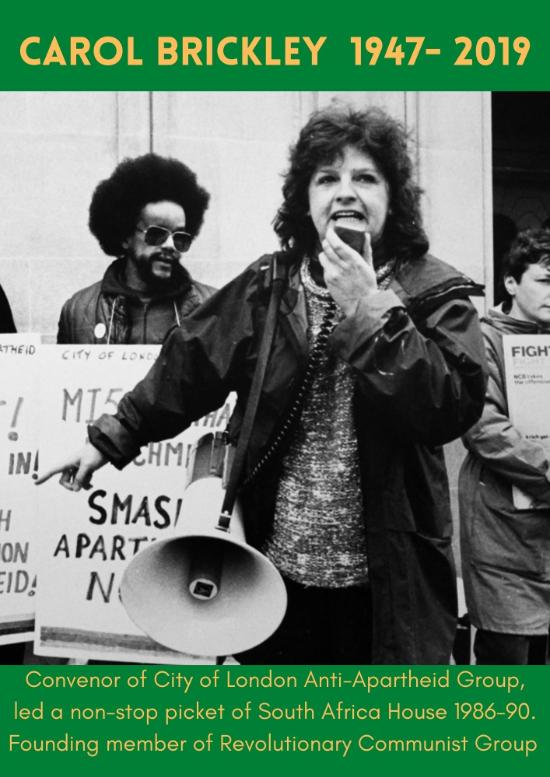Anwar Ditta 1953-2021
Anwar Ditta, who died on 16 November 2021, was an inspiring and fearless woman who took on Britain’s racist immigration laws under first a Labour and then a Conservative government. Between 1976-1981 she led the fight to reunite her family and bring her children home to Rochdale from Pakistan. Her courage and her determination to fight against the odds and unite with all who supported her campaign made her a leading figure in the anti-racist struggle of the time.
Anwar was born in Birmingham in 1953. After her parents separated, she was sent, aged nine, to live with her grandmother in Pakistan. In 1968 she married Shuja and the couple had three children, Kamran, Imran and Saima. In 1975, leaving the children with relatives, Anwar left Pakistan to join her husband in Britain and set up home in Rochdale. In September 1976, they applied to the Home Office for the children to join them. From this point on they were up against the racist inhumanity of the British state.
A first interview with immigration officials only took place in February 1978 in Manchester airport. It lasted over five hours and the hostility of the immigration officer was clear from the start – Anwar said he was ‘very rude’ and asked ‘awful questions’. In May 1979 they were informed that their application had been refused on the grounds that they’d failed to establish they were the children’s parents – despite the birth certificates, medical records and photographs Anwar and Shuja provided. Anwar volunteered to take blood tests and pay for the cost of an investigation in Pakistan. The Home Office refused. As we reported in FRFI 2 (January-February 1980) ‘The case of Mrs Anwar Ditta and family shows the inherent racism and the inhumanity of the immigration laws’.
As soon as her application was refused, Anwar began attending meetings to win support for her case. Her local Liberal MP, Cyril Smith, would do nothing. After attending an anti-deportation meeting in Manchester she realised she had to set up a campaign to fight for her children. At that first campaign meeting, in Anwar’s and Shuja’s house in Rochdale, it was clear there were two political trends. One was a liberal opportunist trend arguing for a group called ‘Friends of Anwar Ditta’ – avoiding the real political issues of the inherent racism of British immigration laws. The second was an anti-imperialist trend represented by the RCG and others who argued for a militant political struggle under the banner of the Anwar Ditta Defence Campaign (ADDC). It was this position which Anwar supported. She was clear that her fight was part of a wider anti-racist struggle, telling FRFI in 1980: ‘The Labour and Tory party are the same, they are racist. They are doing this to me because I am black. They are breaking up black families. They treat black people worse than animals’ (FRFI 4 May-June 1980).
The ADDC, with Anwar at its centre, organised street meetings across Rochdale in predominantly Asian working class districts and went door-knocking on local estates, getting thousands of signatures on a petition demanding the family’s reunion. Demonstrations were held in Rochdale with wide-ranging platforms including representatives of the anti-imperialist struggle in the north of Ireland. Labour Party and SWP opportunists within the campaign opposed these speakers, but Anwar supported their right to speak as they were supporting her right to her children. It was this political instinct and from it her willingness to speak on any platform where she could raise her case that propelled Anwar into a national figure.
At Anwar and Shuja’s appeal against the rejection of their application for their children on 16 May 1980, the Home Office Prosecutor, ‘launched a virulent tirade of racist abuse against Anwar Ditta and her representatives’ (FRFI 5 July-August 1980). It was not until 30 July Anwar and Shuja heard officially that their appeal had been rejected.
The effects of this tortuous treatment from the Home Office had a profound effect on Anwar’s long-term health and undoubtedly contributed to her early death. It also had a negative effect on the emotional bond between her and her children. As she said told Al Jazeera in 2020: ‘The damage [the Home Office] caused me is a big one. I will never forget that. It’s been torture, but the damage that they caused in the relationship between me and my children… that’s a different thing.’
The work of the ADDC continued and eventually attracted the interest of World in Action investigative programme makers from Granada TV. In March 1981 their investigation into Anwar’s case was aired on TV. Using blood samples they conclusively proved that the three children were Anwar’s and Shuja’s. The Home Office was forced to concede and the children flew into Britain in April 1981.
Although Anwar had won, she continued to speak out against racism and in support of struggles for justice. In 1981, she was prominent in her support for the Bradford 12 campaign. In 1986 she was the main speaker at the launch of the march from Manchester to London against the deportation of our RCG comrade Viraj Mendis.
Anwar was a unique and courageous woman who in fighting for her children confronted the whole range of prejudice and racism in British society. At great personal cost she stood against all this and won.
Manchester RCG is approaching supporters of Anwar Ditta to organise a celebration of her life in Rochdale in the New Year. Contact [email protected]
Fight Racism! Fight Imperialism! No 285, December 2021/January 2022





